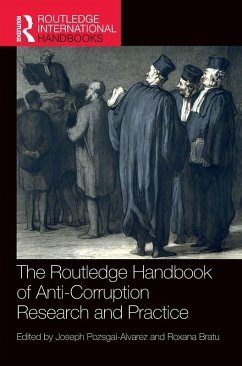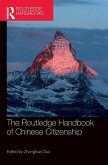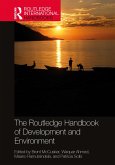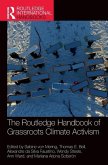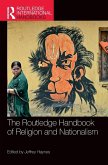The Routledge Handbook of Anti-Corruption Research and Practice takes a multidisciplinary and multidimensional approach to provide a comprehensive exploration of the processes, conditions, and activities that hold the potential to control corruption.
Building on existing knowledge gathered from a variety of social science sources, it strives to provide analytical emancipation of, and coherence to, anti-corruption studies. Anti-corruption transcends the traditional boundaries of state actors, involving individual and organizational business actors, civil society groups, members of the media, accounting, and legal professions, as well as sports associations and other non-traditional actors. This handbook adopts a holistic approach to reflect the rich nature of the manifestations of anti-corruption - past and present - and the possible shapes it may still take in the future.
This handbook is a key reference for scholars, students and practitioners engaged in the study and practice of anti-corruption, corruption, democracy, public administration, comparative politics, as well as more broadly to the wider social sciences.
Chapter 2 and Chapter 46 of this book is freely available as a downloadable Open Access PDF at http://www.taylorfrancis.com under a Creative Commons Attribution-Non Commercial-No Derivatives (CC-BY-NC-ND) 4.0 license.
Building on existing knowledge gathered from a variety of social science sources, it strives to provide analytical emancipation of, and coherence to, anti-corruption studies. Anti-corruption transcends the traditional boundaries of state actors, involving individual and organizational business actors, civil society groups, members of the media, accounting, and legal professions, as well as sports associations and other non-traditional actors. This handbook adopts a holistic approach to reflect the rich nature of the manifestations of anti-corruption - past and present - and the possible shapes it may still take in the future.
This handbook is a key reference for scholars, students and practitioners engaged in the study and practice of anti-corruption, corruption, democracy, public administration, comparative politics, as well as more broadly to the wider social sciences.
Chapter 2 and Chapter 46 of this book is freely available as a downloadable Open Access PDF at http://www.taylorfrancis.com under a Creative Commons Attribution-Non Commercial-No Derivatives (CC-BY-NC-ND) 4.0 license.
"The Routledge Handbook of Anti-Corruption Research and Practice is a comprehensive resource that covers all the essential topics in anti-corruption research and practice while delving into the crucial challenges of our times and exploring innovative methodologies. A brilliant contribution to the field."
Claudia Baez-Camargo, Basel Institute on Governance, Switzerland
"Finally, a book that takes a comprehensive approach to anti-corruption. It not only explores the critical legal dimensions but also engages with broader socio-political dynamics, such as power, social activism, and the narratives that shape anti-corruption strategies and outcomes. It features examples from Western and Eastern European societies, as well as case studies from South Korea, Thailand, Brazil, Colombia, and South Africa. It is essential reading for scholars, practitioners, and students who study corruption and anti-corruption efforts."
David Jancsics, San Diego State University, USA
"In The Routledge Handbook of Anti-Corruption Research and Practice, Roxana Bratu and Joseph Pozsgai-Alvarez have harvested an impressive bouquet of contributions from eminent and up-and-coming researchers from the multi-dimensional field that anti-corruption research is today. Readers who are looking for a meta-analysis of the field and reviews of global political and regulatory frameworks will inadvertently also be drawn into rich case studies and critical reflections."
Sofie Arjon Schütte, Principal Adviser, U4 Anti-Corruption Resource Centre, Chr. Michelsen Institute, Norway
Claudia Baez-Camargo, Basel Institute on Governance, Switzerland
"Finally, a book that takes a comprehensive approach to anti-corruption. It not only explores the critical legal dimensions but also engages with broader socio-political dynamics, such as power, social activism, and the narratives that shape anti-corruption strategies and outcomes. It features examples from Western and Eastern European societies, as well as case studies from South Korea, Thailand, Brazil, Colombia, and South Africa. It is essential reading for scholars, practitioners, and students who study corruption and anti-corruption efforts."
David Jancsics, San Diego State University, USA
"In The Routledge Handbook of Anti-Corruption Research and Practice, Roxana Bratu and Joseph Pozsgai-Alvarez have harvested an impressive bouquet of contributions from eminent and up-and-coming researchers from the multi-dimensional field that anti-corruption research is today. Readers who are looking for a meta-analysis of the field and reviews of global political and regulatory frameworks will inadvertently also be drawn into rich case studies and critical reflections."
Sofie Arjon Schütte, Principal Adviser, U4 Anti-Corruption Resource Centre, Chr. Michelsen Institute, Norway

